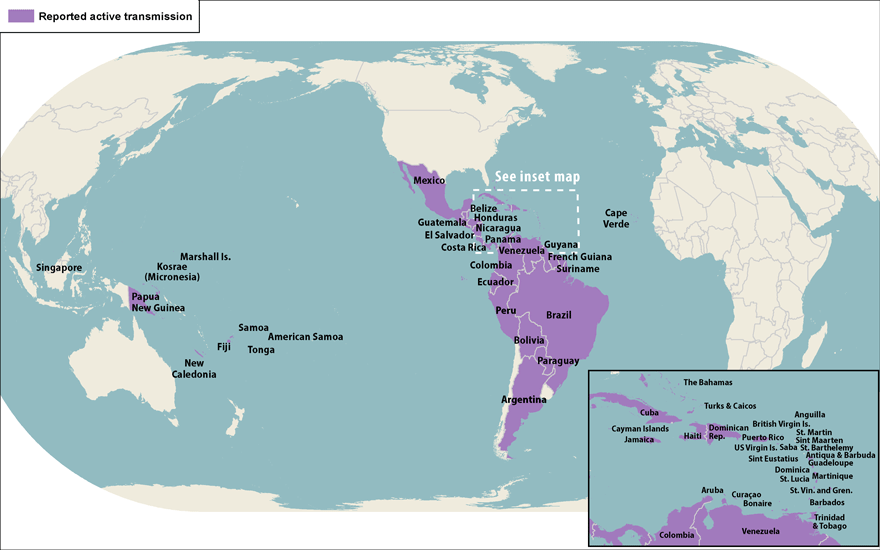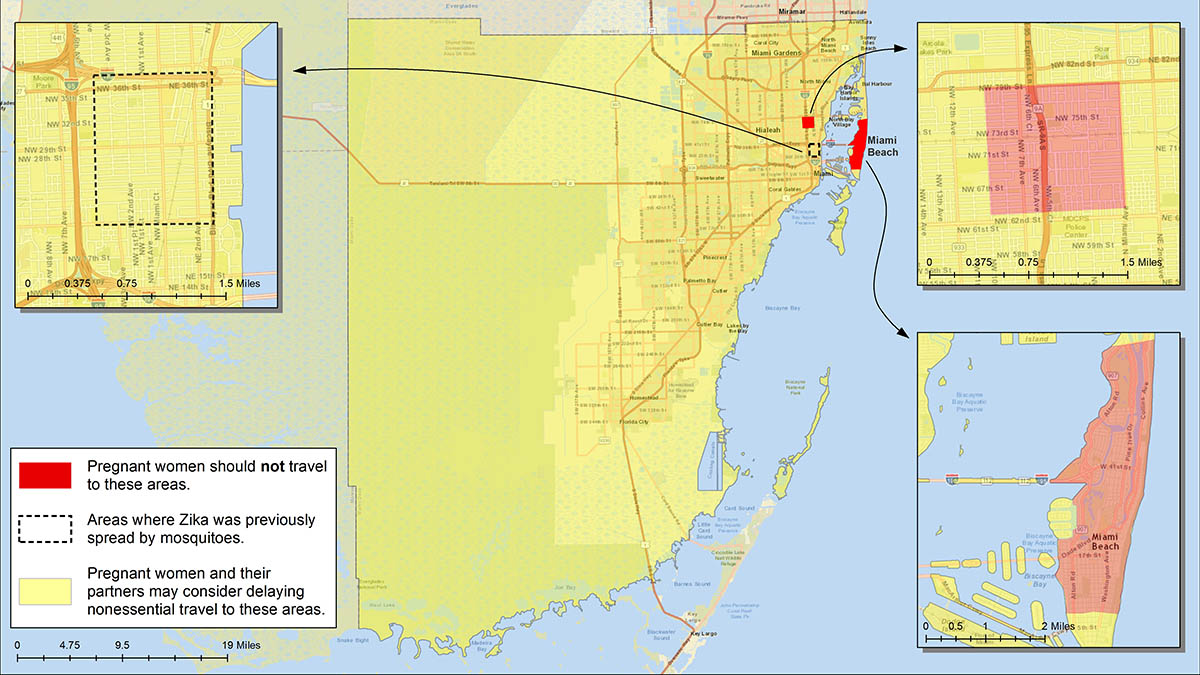Zika virus infection travel notice: Difference between revisions
Tarek Nafee (talk | contribs) |
|||
| Line 11: | Line 11: | ||
==Travel Notice== | ==Travel Notice== | ||
====South Florida==== | |||
:'''Updated guidance for Wynwood area and Miami-Dade County (red area on map below):''' | |||
:*Pregnant women and partners of pregnant women who are worried about potential exposure to Zika may consider postponing nonessential travel to all parts of Miami-Dade County, including the Wynwood area. | |||
:*Pregnant women and partners of pregnant women living in or traveling to the area should strictly follow steps to prevent mosquito bites. | |||
:*Women and men living in or who traveled to the area should be aware that the location was considered to have active Zika virus transmission from June 15 to September 18, 2016. Pregnant women should talk to their doctor or other healthcare provider about getting tested for Zika. Partners of pregnant women should consistently and correctly use condoms to prevent passing Zika during sex, or they should not have sex during the pregnancy. | |||
:*Women and men who do not have signs or symptoms of Zika and who traveled to the area from June 15 to September 18 should wait at least 8 weeks before trying to get pregnant. | |||
:*Men who had signs or symptoms of Zika or were diagnosed with Zika and who traveled to the area from June 15 to September 18 should wait at least 6 months before trying to get their partner pregnant. | |||
:'''Updated guidance for Miami Beach area:''' | |||
:*Pregnant women should not travel to the Miami Beach area. | |||
:*Pregnant women and partners of pregnant women living in or traveling to this area should strictly follow steps to prevent mosquito bites. | |||
:*Women and men who live in or traveled to this area and who have a pregnant sex partner should use condoms to prevent infection every time they have sex or not have sex during the pregnancy. | |||
:*Pregnant women who live in or frequently travel to this area should be tested in the first and second trimester of pregnancy. | |||
:*Pregnant women who traveled to or had unprotected sex with a partner that traveled to or lives in this area should talk to their healthcare provider and should be tested for Zika. | |||
:*Women and men who live in or frequently travel to this area should talk to their healthcare provider about plans for pregnancy. | |||
:*Women and men who traveled to this area should wait at least 8 weeks before trying to get pregnant. | |||
<br> | |||
[[Image:Floridazika.jpg|800px]] | |||
===Travel to Cape Verde=== | ===Travel to Cape Verde=== | ||
{| border="1" style="border-collapse:collapse; text-align:left;" cellpadding="5" | {| border="1" style="border-collapse:collapse; text-align:left;" cellpadding="5" | ||
| Line 122: | Line 141: | ||
|} | |} | ||
*According to the Centers for Disease Control and Prevention (CDC), the first local transmission of Zika virus infection (Zika) was reported in Singapore in August 2016. | *According to the Centers for Disease Control and Prevention (CDC), the first local transmission of Zika virus infection (Zika) was reported in Singapore in August 2016. | ||
==Travel Plan== | ==Travel Plan== | ||
Revision as of 16:32, 17 October 2016
| Zika virus infection travel notice | |
 | |
|---|---|
| Zika Endemic Areas |
|
Zika virus infection Microchapters |
|
Diagnosis |
|
Treatment |
|
Case Studies |
|
Zika virus infection travel notice On the Web |
|
American Roentgen Ray Society Images of Zika virus infection travel notice |
|
Risk calculators and risk factors for Zika virus infection travel notice |
Editor-In-Chief: C. Michael Gibson, M.S., M.D. [1]; Associate Editor(s)-in-Chief: Yamuna Kondapally, M.B.B.S[2]
Overview
The CDC has issued level 2 alert (practice enhanced precautions) for travelers to Cape Verde, the Carribean, Central America, Mexico, Pacific Islands, and South America.
Travel Notice
South Florida
- Updated guidance for Wynwood area and Miami-Dade County (red area on map below):
- Pregnant women and partners of pregnant women who are worried about potential exposure to Zika may consider postponing nonessential travel to all parts of Miami-Dade County, including the Wynwood area.
- Pregnant women and partners of pregnant women living in or traveling to the area should strictly follow steps to prevent mosquito bites.
- Women and men living in or who traveled to the area should be aware that the location was considered to have active Zika virus transmission from June 15 to September 18, 2016. Pregnant women should talk to their doctor or other healthcare provider about getting tested for Zika. Partners of pregnant women should consistently and correctly use condoms to prevent passing Zika during sex, or they should not have sex during the pregnancy.
- Women and men who do not have signs or symptoms of Zika and who traveled to the area from June 15 to September 18 should wait at least 8 weeks before trying to get pregnant.
- Men who had signs or symptoms of Zika or were diagnosed with Zika and who traveled to the area from June 15 to September 18 should wait at least 6 months before trying to get their partner pregnant.
- Updated guidance for Miami Beach area:
- Pregnant women should not travel to the Miami Beach area.
- Pregnant women and partners of pregnant women living in or traveling to this area should strictly follow steps to prevent mosquito bites.
- Women and men who live in or traveled to this area and who have a pregnant sex partner should use condoms to prevent infection every time they have sex or not have sex during the pregnancy.
- Pregnant women who live in or frequently travel to this area should be tested in the first and second trimester of pregnancy.
- Pregnant women who traveled to or had unprotected sex with a partner that traveled to or lives in this area should talk to their healthcare provider and should be tested for Zika.
- Women and men who live in or frequently travel to this area should talk to their healthcare provider about plans for pregnancy.
- Women and men who traveled to this area should wait at least 8 weeks before trying to get pregnant.
Travel to Cape Verde
|
CDC ALERT - LEVEL 2 - Practice Enhanced Precautions |
- According to the Centers for Disease Control and Prevention (CDC), Cape Verde reported the first local transmission of Zika virus infection (Zika) in October 2015.
Travel to the Caribbean
|
CDC ALERT - LEVEL 2 - Practice Enhanced Precautions |
- According to the Centers for Disease Control and Prevention (CDC), the first local transmission of Zika virus infection (Zika) was reported in the Caribbean in December 2015.
- Since then, the following Caribbean destinations have reported ongoing transmission of Zika:
- Anguilla
- Antigua and Barbuda
- Bahamas
- British Virgin Islands
- Cayman Island
- Cuba
- Domanica
- Aruba
- Barbados
- Bonaire
- Curaçao
- Dominican Republic
- Grenada
- Guadeloupe
- Haiti
- Jamaica
- Martinique
- The Commonwealth of Puerto Rico, a U.S. territory
- Saba
- Saint Barthelemy
- Saint Lucia
- Sint Eustatius
- Saint Martin
- Saint Vincent and the Grenadines
- Sint Maarten
- Trinidad and Tobago
- U.S. Virgin Islands
- Turks and Caicos Islands
Travel to Central America
|
CDC ALERT - LEVEL 2 - Practice Enhanced Precautions |
- According to the Centers for Disease Control and Prevention (CDC), the first local transmission of Zika virus infection (Zika) was reported in Central America in November 2015.
- Belize
- Costa Rica
- El Salvador
- Guatemala
- Honduras
- Nicaragua
- Panama
Travel to Mexico
|
CDC ALERT - LEVEL 2 - Practice Enhanced Precautions |
- According to the Centers for Disease Control and Prevention (CDC), the first local transmission of Zika virus infection (Zika) was reported in Mexico in November 2015.
Travel to Pacific Islands
|
CDC ALERT - LEVEL 2 - Practice Enhanced Precautions |
- According to the Centers for Disease Control and Prevention (CDC), the first local transmission of Zika virus infection (Zika) was reported in Samoa in November 2015.
- The following destinations in the Pacific Islands have reported ongoing transmission of Zika:
- Fiji
- Micronesia
- Papua New Guinea
- American Samoa
- Marshall Islands
- New Caledonia
- Samoa
- Tonga
Travel to South America
|
CDC ALERT - LEVEL 2 - Practice Enhanced Precautions |
- According to the Centers for Disease Control and Prevention (CDC), the first local transmission of Zika virus infection (Zika) was reported in South America in November 2015.
- Argentina
- Peru
- Bolivia
- Brazil
- Colombia
- Ecuador
- French Guiana
- Guyana
- Paraguay
- Suriname
- Venezuela
Travel to Singapore
|
CDC ALERT - LEVEL 2 - Practice Enhanced Precautions |
- According to the Centers for Disease Control and Prevention (CDC), the first local transmission of Zika virus infection (Zika) was reported in Singapore in August 2016.
Travel Plan
Protection from mosquito bites
- Travelers should prevent mosquito bites during and after the trip.
- Travelers returning from Zika endemic area should take steps to prevent mosquito bites for 3 weeks (even if they do not feel sick), so they do not spread Zika to mosquitoes that could spread the virus to other people.
For more information regarding prevention of mosquito bites click here
Pregnant or trying to be pregnant
- If you are pregnant avoid travelling to Zika endemic areas.
- If you or your partner trying to get pregnant, consider avoiding nonessential travel to Zika endemic areas.
- Practice safe sex practices if the partner traveled to the Zika endemic areas.
For more information regarding prevention of Zika virus through sexual transmission click here
Consult doctor
Consult doctor or healthcare professional immediately, if you have signs and symptoms of ZIKV infection after travel from Zika endemic areas.
